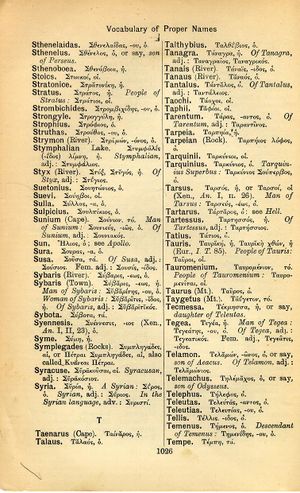Strymon
Ἴσος ἴσθι πᾶσι, κἂν ὑπερέχῃς τῷ βίῳ → Quamvis superior sorte, da te aequum omnibus → Sei allen gleich, auch wenn du reicher bist
English > Greek (Woodhouse)
(River), Στρυμών, -όνος, ὁ.
Latin > English (Lewis & Short)
Strȳmon: (nom. Strymo, Sen. Q. N. 1 praef.
I med.; Plin. 4, 10, 17, § 38), ŏnis and ŏnos (acc. Strymona, Nep. Cim. 2, 2; Plin. 22, 10, 12, § 27: Strymonem, Liv. 44, 44, 8; 45, 29), m., = Στρυμών>.
I The river Strymon, in Macedonia, on the borders of Thrace, now Struma or Kara-su, Mel. 2, 2, 2 and 9; Plin. 4, 10, 17, § 38; 22, 10, 12, § 27; Verg. G. 4, 508; Ov. M. 2, 257; Liv. 44, 44, 8; Prop. 4 (5), 4, 72 al.—Many cranes lived upon its banks, Luc. 3, 199; Claud. B. Gild. 476.—
II Poet., Thrace, Stat. Th. 5, 188.—Hence,
A Strȳmŏnĭus, a, um, adj., of or belonging to Strymon, Strymonian: grues, Verg. G. 1, 120; id. A. 10, 265; also called grex, Mart. 9, 30, 8.—Poet. for Thracian or northern: matres, Ov. Ib. 602: Arctos. Stat. Th. 3, 526: Aquilo, Sen. Agam. 479.—
B Strȳ-mŏnis, ĭdis, adj. f., of or belonging to Thrace; subst., a Thracian woman: qualis Strymonis abscisso fertur aperta sinu, i. e. Amazon, Prop. 4 (5), 4, 72.

